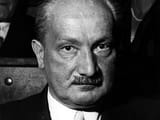>>24666875
A very very simplified way of seeing what Heidegger's doing is to see that his subject, Being, is about intelligibility, and in a very broad way that includes how a being can be understood through predication, identity, poetically, falsely, circumstantially according to culture (e.g., the difference between how we understand an impact drill vs what a tribesman might understand it or not understand it to be), and so on. Most of his arguments with older philosophers come from suspecting that their answers to that question are resolved by appeal to another kind of being, an Idea, a Prime Mover, a God, or what have you. He's not necessarily saying that their answers don't have anything to them, but that they kick the can down the road as far as his own subject is concerned. He also admits that his work taken as a whole isn't necessarily any sign of his superiority, but of how thorny it is to work out his questions in a way comprehensive enough to answer them for us today in a way that holds as well for philosophers 2,500 years ago.
Everyone focuses on Being and Time, but that's on account of how strongly it influenced existentialism and being practically his only available work until his lectures and other writings were edited, published, and translated, but I think the lectures are much more exciting than Being and Time, since at least in the 20s you get to see him work out his analyses in the classroom and adjust them over a number of years, whereas Being and Time makes the work that went into conceiving it somewhat invisible and leaves readers mystified as to how he justifies any of it.
He's also hard to pinpoint on account of how many texts make up his corpus, you could characterize him in a way that may be perfectly true in the mid-20s and be completely off in holding him to those positions just a few years later or by the 60s. But one of his first courses, the 1918 Towards a Definition of Philosophy, has a very good and clear example of what he's after in a passage about a lectern.





